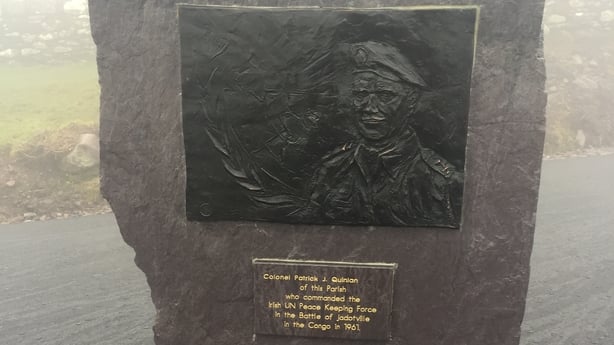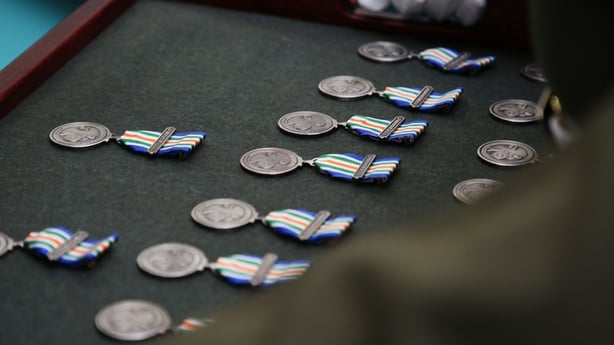An Irish Army officer who served on a UN peacekeeping mission that came under attack in Congo in 1961 has welcomed the establishment of a review group over the issue of medals for gallantry.
Noel Carey was the youngest of ten Irish Army officers at Jadotville when the mission was attacked by an army of more than 3,000 mercenaries.
Ireland's 35th Battalion 'A' Company held off the attack for five days, despite being ill-equipped and outnumbered, before they were forced to surrender.
They suffered no fatalities, but inflicted a significant number of casualties on the enemy.
The action of their commanding officer, Commandant Pat Quinlan, is cited in military textbooks worldwide as the best example of the use of the so-called perimeter defence.
On their return to Ireland, the bravery of the men who fought in Jadotville was not recognised and many were left with a sense of embarrassment about surrendering.
The men of 35th Battalion 'A' Company were recommended for the Distinguished Service Medal for gallantry by Col Quinlan, who also recommend that five of them be awarded the Military Medal for Gallantry, the Irish Army's highest award.

An examination of the events at Jadotville was carried out by the Defence Forces in 2004 and recommended that the contribution of the 35th Battalion be recognised and a number of initiatives followed.
In 2017, the government decided to award the newly commissioned 'Jadotville Medal' to each member of the battalion, including to the families of members who have since died, in recognition of the courageous actions of the men during the siege.
However, campaigners want the original gallantry medals as recommended by Col Quinlan to be awarded.
Last night, Minister for Defence Simon Coveney told the Seanad that the issue of these medals for gallantry will be considered by an independent group of experts.
Today in Mayo, Jadotville veteran Noel Carey welcomed news from Minister Coveney that medals of gallantry will considered by a panel of experts @rtenews #Jadotville @simoncoveney @UNPeacekeeping @defenceforces @siegejadotville pic.twitter.com/NTDilIDdNF
— TERESA MANNION (@TeresaMannion) November 12, 2020
Mr Coveney said that from 13 to 17 September 1961, the men of A Company were under almost constant attack and at the end of the siege were taken prisoner before being released on 25 October.
He said that in 1962 and 1965, a constituted medals board considered the issue of the awarding of medals, but none were awarded for any citation that mentioned Jadotville and despite a subsequent review, the board was not prepared to alter its findings.
Speaking on RTÉ's Morning Ireland, Mr Carey said: "I hope we the veterans will get a chance to give our story to the board when the time comes. This was totally denied to us when we came back in December 1961 to a situation where nobody knew this happened."
He said communications were "naturally appalling" at that time and they were left there, and said the "efforts of the Defence Force was to airbrush us out of the history of the army".
Mr Carey said that only for the efforts of some veterans, and Declan Power who wrote about the incident in his book 'The Siege of Jadotville', the story would never have been told.

Mr Power, who is a former member of the Defence Forces, said the review group will serve as "a last link in the chain" to deal with the long running issue.
"The Army were constrained by regulations for many years in trying to find a resolution to this," he said, adding what is happening now is taking it to an outside group to look at and to take things into context.
Mr Power said a lack of documentary evidence is an issue, but Mr Carey was one of the soldiers recommended for distinguished service for holding a position by himself during a bombardment and left manning a machine gun.
He said the importance here is striking the right tone between seeing justice can be done with regard to restoring valour and reputation, and ensuring decorations still retain their status as highly sought after.
For his part, Mr Carey said he always believed any award should be purely on merit. He said Col Quinlan's bravery in particular should be commended.
"If it wasn't for Pat Quinlan I probably wouldn't be here today. Pat Quinlan's bravery not just there (in Congo) when we were kept as prisoners.
"He was an absolute hero and he should be the person who gets the highest honour from this review board."
In 2016, the 'A' Company was awarded a presidential unit citation for its collective role in the siege.
The group of external experts will include ex-military officers, a historian and an academic to examine the full details of the case.

